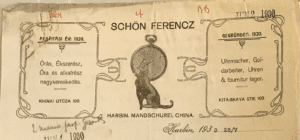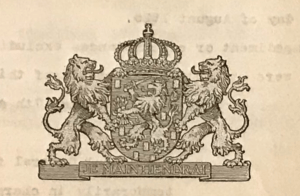Ferenc Schön was a clockmaker and run a jewelry store on the Kitaiskaia Street (Китайская улица) – the pumping artery of Harbin’s commerce and business. Between the 1920s and 1940s he lived just next door to the New Synagogue on Jingwei jie (经纬街), where he visited the weekly service. His wife, Elisabeta and their daughter, Rahil were both native Harbiners/Harbintsi (Харбинцы)*, while Schön himself was born far away, the Russian Empire stretching in between his hometown and his residence for most of his life in Manchuria. Probably none of them imagined that one day they will move from the frigid Chinese Northeast to the sun-scorched land of Israel. In this post, I will sketch up the life of an ex-Austro-Hungarian prisoner of war of Hungarian nationality and of Jewish confession living in the Russo-Chinese town of Harbin, that for the most part of the period was occupied by Japanese forces. The aim here is to give an idea of the kind of people my research is dealing with.

Ferenc Schön’s letterhead advertising his Kitaiskaia store in Harbin, China, written in German and Hungarian languages (MNL)
